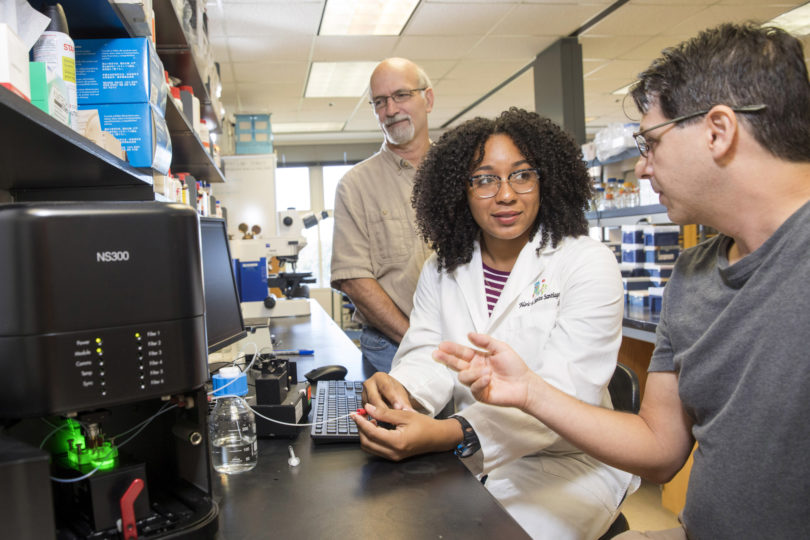Grad school ready

PREP@UGA Scholars program trains next generation of life sciences researchers.
As an undergraduate student in Maryland, Ian Liyayi planned to major in nursing but got lost on the campus tour and found himself in the biochemistry department. He liked that even better.
When it came to preparing for graduate school, Liyayi didn’t want to get lost along the way, so he applied for the University of Georgia’s competitive PREP@UGA Scholars program to give him more experience before he began applying to doctoral programs.
“This program gets you fully ready for grad school because you get a ton of time in the lab,” said Liyayi, a current scholar who said he enjoyed research experiences in his undergraduate years at Stevenson University but didn’t gain much hands-on laboratory experience on long-term projects.
“I knew I wanted to do graduate school, but I didn’t feel like I was completely ready,” said Liyayi, a native of Kenya who grew up in Baltimore. “This program seemed like a perfect fit.”
With funding from a National Institutes of Health grant, the PREP@UGA Scholars program was created five years ago. Earlier this year, co-directors Erin Dolan and Mark Tompkins received a $2.1 million, five-year grant renewal, which will continue to fund a cohort each year of six to eight scholars from underrepresented groups or with limited opportunities in the STEM fields at their undergraduate institution.
To date, 32 students have participated in the program. About one in four later enrolled in a UGA doctoral program, with the remainder going on to graduate programs at other institutions. Programs such as PREP@UGA have helped make UGA the nation’s top public flagship university for the number of doctoral degrees it awards to African Americans.
“Undergraduate students are in the mindset of taking classes, but in grad school they don’t just consume knowledge, they create it,” said Dolan, Georgia Athletic Association Professor of Innovative Science Education in the department of biochemistry and molecular biology, part of the Franklin College of Arts and Sciences. “This program smooths that transition to graduate school and to thinking like a scientist.”
While students spend most of their time in a laboratory, they also go through professional development workshops and benefit from the advice of a faculty mentor and an advanced graduate student or postdoctoral mentor. “It’s a holistic program,” Dolan said. “We focus on the research experience and the career around it.”
For Jilarie Santos Santiago, those mentors have helped her realize her potential in just her first few weeks on campus. “I am stepping out of my comfort zone,” said the graduate of the University of Puerto Rico Humacao, who is currently conducting research in Stephen Hajduk’s lab.
As an undergraduate, Santos Santiago worked on a project for several years to determine a way to thwart parasitic nematodes from destroying the plantain harvest on her home island, but she wanted to explore other areas of life sciences research and learn new techniques before beginning a doctoral program. She also wanted to improve her communication skills, and she’s excited to learn more about the process of publishing research articles.
“The transition to a Ph.D. program, it can be overwhelming. Even this building is confusing when you come from a small college,” Santos Santiago said from her lab in the Davison Life Sciences Complex. “It can be a lot to take in, but if you don’t take the first step, you never do it. This was the right first step for me.”
Tompkins, a professor of infectious diseases in the College of Veterinary Medicine, said his experience as a mentor for a PREP@UGA Scholar last year drove home the impact of the program on students, the research team and on academia as a whole.
“It’s a win-win for the students, the faculty member and the research mentor,” he said. “The perspectives that the scholars bring add a richness to the lab. For the university and academia, the program will have an intangible impact on increasing diversity in the long run.”
Tompkins’ former scholar, Carlie Neiswanger, who has recently begun her doctoral program in pharmacology at the University of Washington, said her experience as a PREP@UGA Scholar was “nothing short of life-changing.”
After a rocky start to her undergraduate education, she found her passion as a returning student but didn’t believe she had the grades and test scores to make graduate school an option. But her postbaccalaureate experience changed that while providing lessons in independent thinking and problem solving that have given her confidence going into her doctoral program.
“I knew that I wanted to stay in research after graduation, but I was at a loss for what the next steps would be if I wasn’t prepared for graduate school. The PREP program was a near-perfect solution for me,” said Neiswanger, an alumna of Washington State University. “Not only did I get to experience what it means to work full time in a lab while learning to balance things like classes and social life, it truly made me feel prepared for graduate work. … I worked really, really hard, and it paid off. Now I’m ready for the next step.”
First published at https://news.uga.edu/grad-school-ready/
